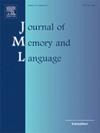重新审视语言中的逻辑:毕竟,每个全称量词的范围都是相似的
IF 3
1区 心理学
Q1 LINGUISTICS
引用次数: 0
摘要
像“每只熊走近一个帐篷”这样的双量词是模棱两可的:每只熊是走近了一个不同的帐篷,还是走近了同一个帐篷?假设这两种解释在心理上被表示为逻辑表示,逻辑表示指定了不同量词如何相互分配范围。基于一项结构启动研究,Feiman和Snedeker(2016)认为,逻辑表征捕获了特定于量词的组合属性(例如,每个的规范不同于逻辑表征中的每个的规范)。我们通过测试荷兰语的逻辑表征启动来重新检验这一结论。在四个实验中,我们观察到如果相同的量词在启动项和目标中重复出现,并且如果启动项和目标包含不同的量词,也会出现逻辑表征的启动。然而,量词之间的逻辑表征启动不如同一量词内的启动一致。更具体地说,我们的研究结果表明,如果参与者在启动试验中看到量词变化,那么量词之间的启动会更加强烈。然而,当量词之间的启动出现时,其强度与同一量词内的启动相当。因此,我们得出结论,逻辑表示在范围分配中不指定量词特定的偏差。本文章由计算机程序翻译,如有差异,请以英文原文为准。
Revisiting the logic in language: The scope of each and every universal quantifier is alike after all
A doubly-quantified sentence like Every bear approached a tent is ambiguous: Did every bear approach a different tent, or did they approach the same tent? These two interpretations are assumed to be mentally represented as logical representations, which specify how the different quantifiers are assigned scope with respect to each other. Based on a structural priming study, Feiman and Snedeker (2016) argued that logical representations capture quantifier-specific combinatorial properties (e.g., the specification of every differs from the specification of each in logical representations). We re-examined this conclusion by testing logical representation priming in Dutch. Across four experiments, we observed that priming of logical representations emerged if the same quantifiers are repeated in prime and target, but also if the prime and target contained different quantifiers. However, logical representation priming between quantifiers emerged less consistently than priming within the same quantifier. More specifically, our results suggest that priming between quantifiers emerges more robustly if the participant is presented with quantifier variation in the prime trials. When priming between quantifiers emerged, however, its strength was comparable to priming within the same quantifier. Therefore, we conclude that logical representations do not specify quantifier-specific biases in the assignment of scope.
求助全文
通过发布文献求助,成功后即可免费获取论文全文。
去求助
来源期刊
CiteScore
8.70
自引率
14.00%
发文量
49
审稿时长
12.7 weeks
期刊介绍:
Articles in the Journal of Memory and Language contribute to the formulation of scientific issues and theories in the areas of memory, language comprehension and production, and cognitive processes. Special emphasis is given to research articles that provide new theoretical insights based on a carefully laid empirical foundation. The journal generally favors articles that provide multiple experiments. In addition, significant theoretical papers without new experimental findings may be published.
The Journal of Memory and Language is a valuable tool for cognitive scientists, including psychologists, linguists, and others interested in memory and learning, language, reading, and speech.
Research Areas include:
• Topics that illuminate aspects of memory or language processing
• Linguistics
• Neuropsychology.

 求助内容:
求助内容: 应助结果提醒方式:
应助结果提醒方式:


